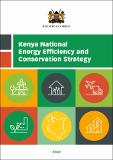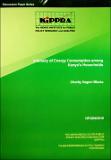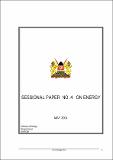| dc.date.accessioned | 2021-03-31T04:56:59Z | |
| dc.date.available | 2021-03-31T04:56:59Z | |
| dc.date.issued | 2007 | |
| dc.identifier.uri | http://repository.kippra.or.ke/handle/123456789/2774 | |
| dc.description.abstract | Energy fuels virtually all the systems supporting mankind, and is essential in
both rural and urban areas. Lack of adequate and reliable energy supply
reduces the potential/or achieving major structural changes in rural and urban
economies. There is a close correlation between economic growth and quality
of life and demand for energy. A country cannot expect higher levels of economic
growth if energy supplies are constrained. Given the central role of energy in
the economy and its potential for poverty reduction and wealth creation, it is
critical to assess how Kenya can secure energy supply for now and in the future.
The challenges of energy supply in Kenya include low access to modern energy
services, high cost of energy, irregular supply and high cost of energy
investments, among others.
This study uses a Strengths, Weakness, Opportunities, Threats (SWOT) analysis
framework to assess Kenya's energy supply using data from primary and
secondary sources. | en |
| dc.language.iso | en | en |
| dc.publisher | The Kenya Institute for Public Policy Research and Analysis | en |
| dc.relation.ispartofseries | DP/74/2007; | |
| dc.subject | Energy sector | en |
| dc.subject | Energy supply | en |
| dc.subject | Sustainable development | en |
| dc.subject | Renewable energy | en |
| dc.subject | energy Cost | en |
| dc.title | Discussion Paper No. 74 of 2007 on Strategies for Securing Energy Supply in Kenya | en |
| dc.type | KIPPRA Publications | en |
| ppr.contributor.author | Mwakubo, Samuel; Mutua, John; Ikiara, Moses & Aligula, Eric | |




